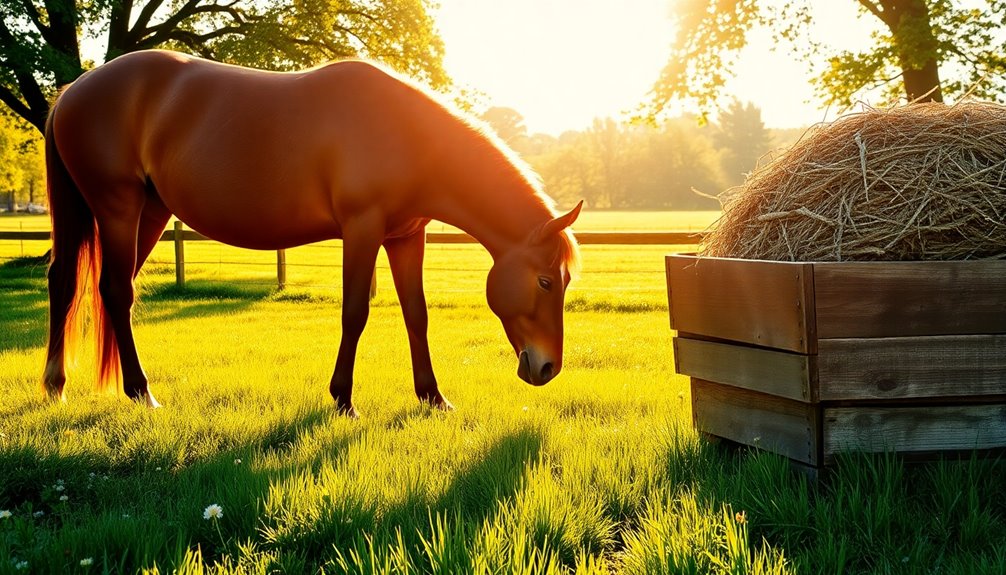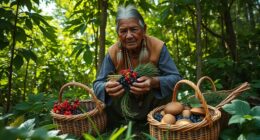Your horse needs between 1.5% and 3.1% of its body weight in forage daily for ideal health. For maintenance horses, aim for 1.5% to 2.5%. If you have a lactating mare or yearling, consider their special requirements, which can be up to 2.8%. It's crucial to monitor your horse's weight and condition to adjust their intake accurately. Choose the right forage type, as grass hay is great for maintenance but legume hay can provide more energy. Keep an eye on their overall diet and activity level to fine-tune their needs; there's much more to explore on this topic!
Key Takeaways
- A horse should consume 1.5% to 3.1% of its body weight in forage daily for optimal health.
- Maintenance horses need 1.5% to 2.5% of their body weight in forage.
- Lactating mares and yearlings require 1.0% to 2.5% of body weight for growth and milk production.
- Performance horses typically need 1.0% to 2.0% of body weight in forage daily.
- Regular monitoring of forage intake ensures dietary needs are consistently met.
Understanding Forage Requirements
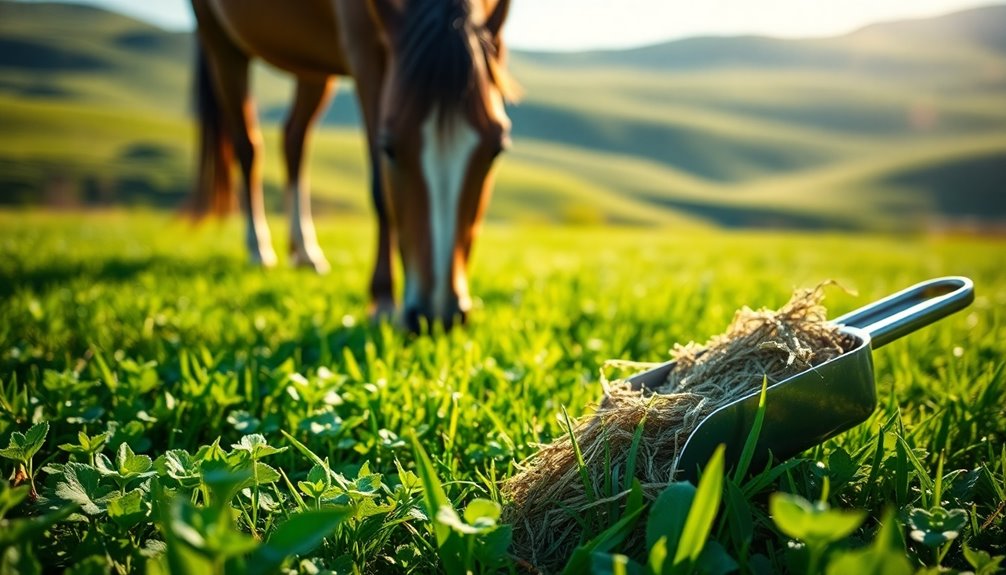
Forage is the cornerstone of a horse's diet, playing an essential role in their health and well-being. Understanding your horse's forage requirements helps guarantee they're getting the right amount based on their body weight.
Generally, horses should consume between 1.5% to 3.1% of their body weight in forage daily. Maintenance horses typically thrive on about 1.5% to 2.5% of their body weight, while lactating mares and yearlings need around 1.0% to 2.5% to support their specific needs.
Performance horses, on the other hand, require slightly less—around 1.0% to 2.0% of their body weight—to meet their energy demands.
It's vital to focus on high-quality forage, as the nutritional value directly impacts your horse's overall health and dietary satisfaction. Poor quality forage can lead to digestive issues and deficiencies, undermining your efforts to maintain a healthy horse.
Calculating Daily Forage Intake
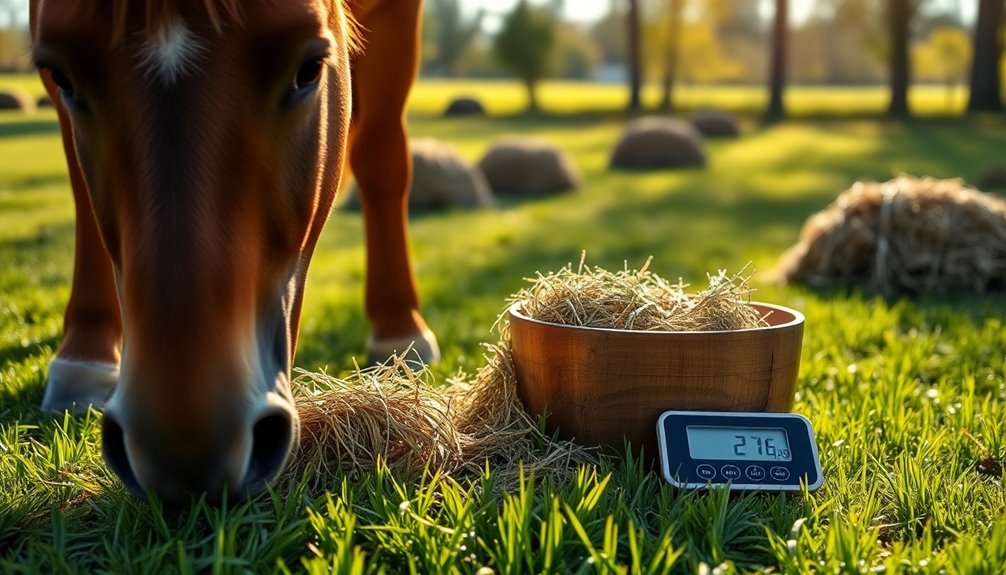
To guarantee your horse receives the right amount of forage daily, you'll need to calculate their intake based on body weight. Horses should consume approximately 1.5% to 3.1% of their body weight in forage daily, depending on their needs. Start by determining your horse's ideal body weight and evaluating their body condition score.
Here's a simple way to visualize the calculations:
| Weight (lbs) | Forage Intake (1.5%) | Forage Intake (3.1%) |
|---|---|---|
| 1,000 | 15 lbs | 31 lbs |
| 1,150 | 17.25 lbs | 35.65 lbs |
| 1,200 | 18 lbs | 37.20 lbs |
As a horse owner, you can calculate how much forage to feed by multiplying your horse's weight by the desired percentage, adjusting based on their activity level and body condition. Always prioritize hay quality; higher quality hay aids nutrient absorption, while lower quality may be better for weight control. Regularly monitor forage consumption to guarantee your horse's dietary needs are met effectively.
Types of Forage Options

Understanding the different types of forage options available is essential to meeting your horse's dietary needs. Horses primarily thrive on forages, which include pasture grasses, baled hay, hay cubes, hay pellets, and haylage.
When feeding, you'll want to confirm that forage intake is about 1.5% to 2.5% of your horse's body weight daily—around 15 to 25 pounds for a 1,000 lb horse.
Hay is a common forage choice and can be classified into two main types: grass hay and legume hay. Grass hay is typically lower in calories and protein, making it suitable for maintenance diets. In contrast, legume hay, such as alfalfa, is richer in both calories and protein, making it ideal for horses needing extra energy or nutrients.
For a balanced diet, consider incorporating hay pellets as well, which provide convenience and can be easier to handle.
Regular nutrient analysis of your chosen hay is crucial to confirm it meets your horse's dietary needs, as nutrient composition can vary considerably.
Factors Influencing Forage Needs
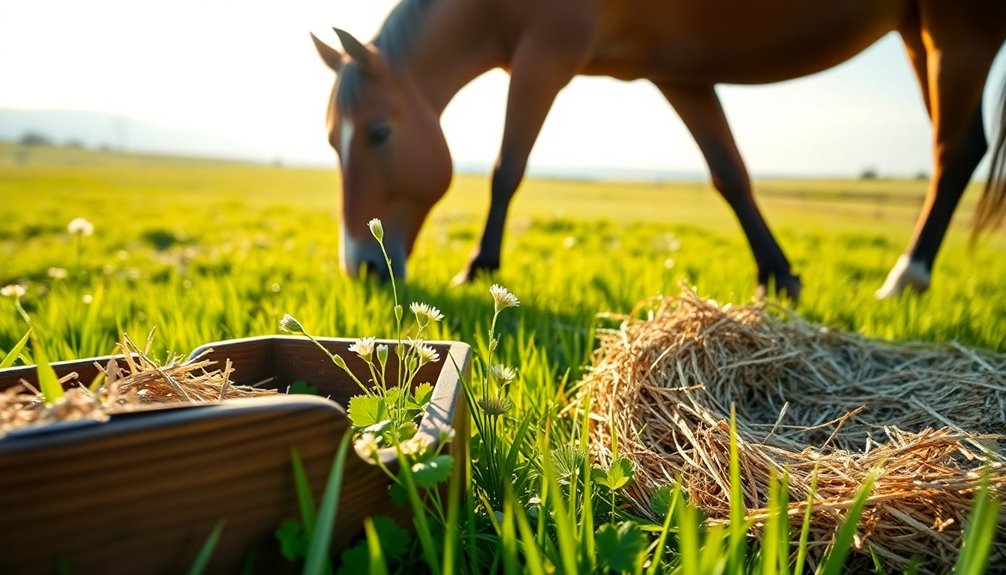
Several factors influence how much forage your horse needs daily. Forage intake typically ranges from 1.5% to 2.5% of your horse's body weight, but this can vary based on age, activity level, and physiological state.
For instance, if you have a lactating mare, expect her forage needs to increase to about 2.8% of her body weight to support milk production.
If your horse is a maintenance or low-level performance type, aim for 1.0-2.0% of their body weight in forage daily. For a 1,150 lb horse, that's roughly 11.5-23 pounds of forage.
Individual metabolism plays a significant role here; "easy keepers" might thrive on less nutrient-dense hay, while "hard keepers" may require richer forage to maintain their weight and energy levels.
Don't overlook the importance of digestive health. Regular access to forage is essential, as long periods without it can lead to serious issues like gastric ulcers.
Health Risks of Overgrazing
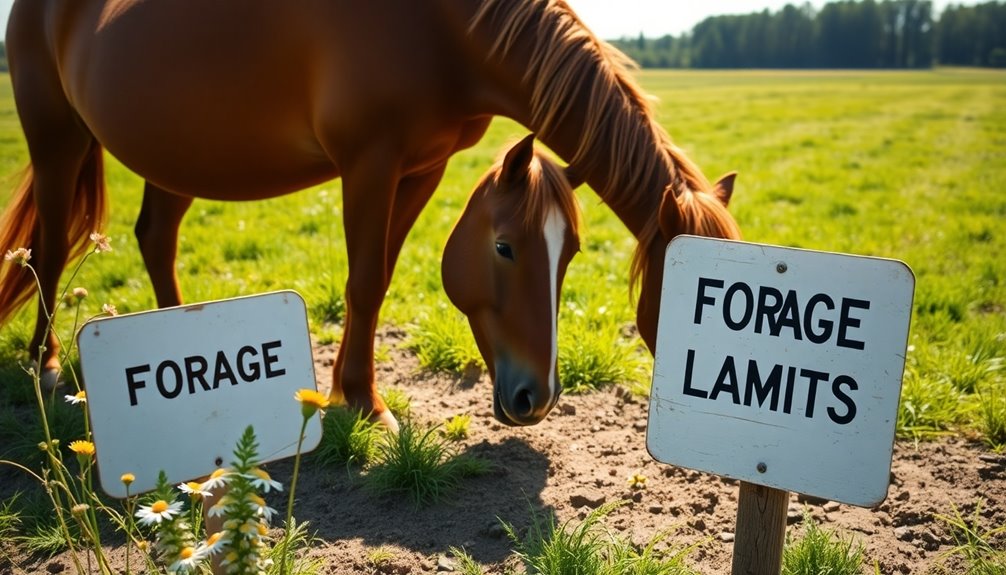
While ensuring your horse gets the right amount of forage is important, managing their grazing habits is equally essential to their health. Overgrazing can lead to several serious health risks that you must be aware of.
When horses consume too much grass, they might face obesity due to the calorie-rich nature of forage. This excess weight can strain their joints and overall health.
Additionally, laminitis is a major concern that can arise from overgrazing. Symptoms like reluctance to walk and heightened hoof pulse indicate distress, signaling a need for immediate attention.
Moreover, overeating grass can lead to colic, which is a leading cause of mortality in horses. Signs of colic include restlessness, sweating, and increased heart rate.
To help you manage these risks, consider these strategies:
- Implement controlled grazing to limit grass intake.
- Establish a consistent feeding routine to regulate calories.
- Monitor your horse's weight regularly to prevent obesity.
Grazing Management Strategies

When managing your horse's grazing, focus on ideal grazing duration to prevent overeating and health issues.
Keep a close eye on grass quality, as it directly impacts your horse's nutrition and weight.
Regularly rotating pastures is essential for maintaining healthy grazing conditions and ensuring your horse gets the best forage possible.
Optimal Grazing Duration
Managing ideal grazing duration is vital for maintaining your horse's health and weight. To achieve this, you need to carefully monitor grass consumption and adjust grazing based on the grass's quality and growth stage. For instance, a 450kg horse typically consumes about 4.5kg of grass in six hours, which is roughly 1% of its body weight.
Consider these strategies to enhance grazing duration:
- Limit grazing time to control calorie intake, especially during lush spring conditions.
- Use half-day turnout or grazing muzzles to reduce grass consumption while still providing access to pasture.
- Monitor your horse's eating pace to prevent rapid consumption, which can lead to digestive issues.
Balancing forage intake with hay and other forages is important for your horse's healthy weight.
Adjust grazing duration based on your horse's activity level and body condition. By implementing these grazing management strategies, you can support your horse's nutritional needs and help maintain an ideal grazing routine that promotes overall well-being.
Grass Quality Monitoring
Monitoring grass quality is essential for ensuring your horse receives the right nutrition and maintains a healthy weight. The nutritional value and calorie density of the grass directly affect your horse's diet. Lush, calorie-rich grass can lead to obesity if not managed properly. Implementing effective monitoring strategies is vital, especially during spring when newly grown grass becomes calorie-dense.
To help you track grass quality and adjust grazing practices, consider the following table:
| Monitoring Aspect | Indicators | Action Needed |
|---|---|---|
| Grass Density | Lush vs. Sparse | Adjust grazing time |
| Calorie Intake | Overconsumption risk | Limit grazing time or use muzzles |
| Nutritional Value | Rich vs. Depleted | Implement pasture rotation |
Pasture Rotation Importance
Pasture rotation is essential for maintaining a healthy grazing environment for your horse. By rotating pastures, you help prevent overgrazing, allowing grass to recover and thrive. This management strategy not only improves pasture health but also reduces the buildup of parasites and diseases in the soil.
Here are some key benefits of pasture rotation:
- Promotes healthier grass growth
- Reduces parasite and disease risks
- Helps manage calorie intake effectively
Monitoring your horse's grass consumption is critical. For instance, an average 450 kg horse can consume about 4.5 kg of grass in just six hours.
To prevent obesity, especially during spring when newly grown grass is calorie-dense, it's essential to manage grazing duration. Implementing a half-day turnout strategy can regulate grass intake while ensuring your horse has access to fresh forage.
Weight Management Techniques
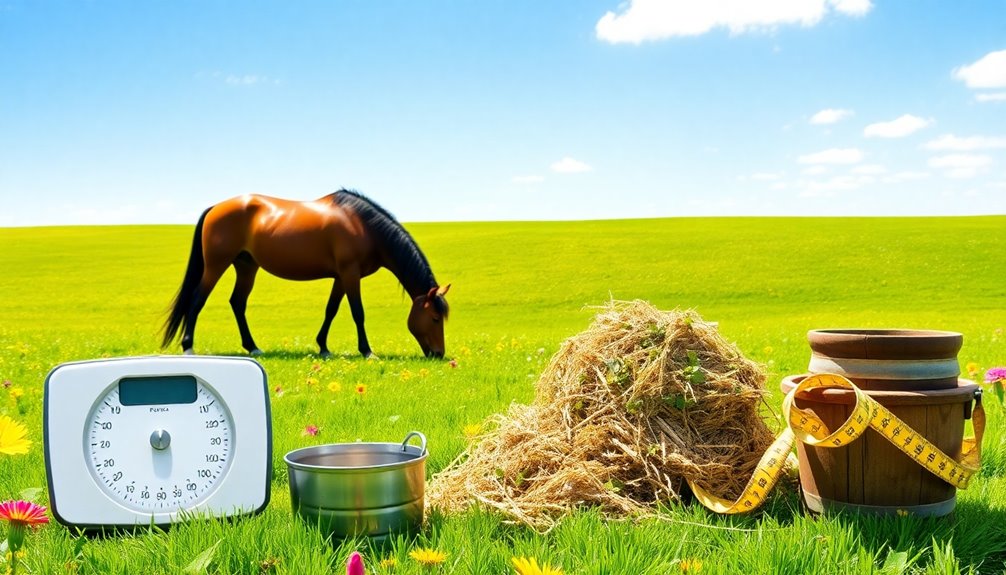
Keeping your horse at a healthy weight is essential for its overall well-being, and there are several effective techniques to help achieve this. First, monitor your horse's forage intake to guarantee it consumes 1.5%–3.1% of its body weight daily. For lactating mares, aim for about 2.8%. Implementing feeding schedules can help regulate calorie consumption and prevent obesity.
Using small-holed haynets is another great strategy. These can prolong eating time and reduce overall hay intake, which is beneficial for overweight horses. Consider offering lower nutritional value hay, like mature grass hay, which provides more volume with fewer calories.
Lastly, gradually increasing your horse's exercise duration or frequency, alongside dietary adjustments, is key for effective weight management and improved cardiovascular health.
| Technique | Benefits |
|---|---|
| Monitor forage intake | Guarantees appropriate calorie levels |
| Use small-holed haynets | Prolongs eating time |
| Offer lower nutritional hay | Reduces calorie intake |
| Increase exercise gradually | Improves overall health |
The Role of Supplements
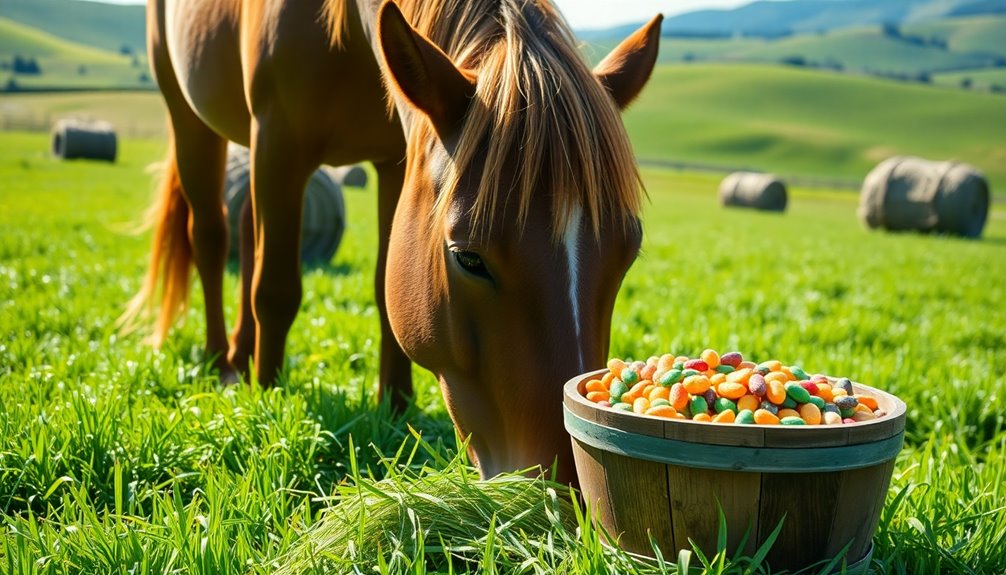
When it comes to your horse's diet, essential vitamins and minerals play an important role in their overall health.
Tailoring supplement recommendations to meet your horse's specific needs guarantees they get the nutrients they might miss from forage alone.
Regularly monitoring their health will help you adjust their diet and supplements as necessary throughout their life stages.
Essential Vitamins and Minerals
For ideal health and performance, horses often need more than just an all-forage diet can provide. While forage is vital, it may not supply all the essential vitamins and minerals your horse requires. This is where supplementation comes into play, ensuring a balanced equine diet that meets their nutritional needs.
Consider these key areas where supplementation might be necessary:
- Vitamin E: Essential for muscle function and immune health.
- Selenium: Important for antioxidant protection and thyroid function.
- Calcium and Phosphorus: Vital for bone health and overall growth.
Regular monitoring of your horse's health and dietary intake is essential to determine if additional vitamins and minerals are needed.
Formulated vitamin and mineral supplements, like those from Kentucky Equine Research, can help fill any gaps in their nutrition. Tailored supplements are particularly important for horses at different life stages, such as growing foals, lactating mares, and performance horses.
Tailored Supplement Recommendations
Understanding your horse's unique nutritional needs is vital for their overall well-being and performance. If your horse is primarily on an all-forage diet, they mightn't get all the essential vitamins and minerals they need. That's where tailored supplements come into play.
Kentucky Equine Research offers specially formulated vitamin and mineral supplements designed to complement forage diets, ensuring ideal health. If your horse is underweight or in light work, consider using ration balancers. These products provide a concentrated source of vitamins and minerals to help achieve balanced nutrition.
Additionally, supplements like Omega Horseshine can improve your horse's coat health and overall appearance. However, it's important to align these supplements with your horse's specific dietary requirements.
Regularly evaluating your horse's health and diet will help you identify any deficiencies that need addressing. Remember, supplementation should be personalized based on your horse's individual needs, lifestyle, and existing diet.
Monitoring Health and Diet
Monitoring your horse's health and diet is essential to guarantee they thrive. To make certain your horse receives ideal nutrition, focus on their forage intake, which should be about 1.5-3.1% of their body weight daily. Regularly check their body condition and consult with a veterinarian or equine nutritionist to identify any nutritional gaps.
Here are a few key points to keep in mind:
- Assess body condition scores to determine overall health and nutritional status.
- Be aware of the potential need for supplementation, especially if your horse is on an all-forage diet.
- Consider popular supplements like vitamin and mineral formulations to address specific deficiencies.
Supplementation might be necessary to provide essential vitamins and minerals that your forage may lack, particularly for lactating mares needing around 2.8% of their body weight in forage.
Ignoring nutritional deficiencies can lead to serious health issues, so make monitoring a priority. By actively managing your horse's diet, you'll help maintain their health and performance, ensuring they get the nutrition they need to excel in their activities.
Importance of Professional Guidance
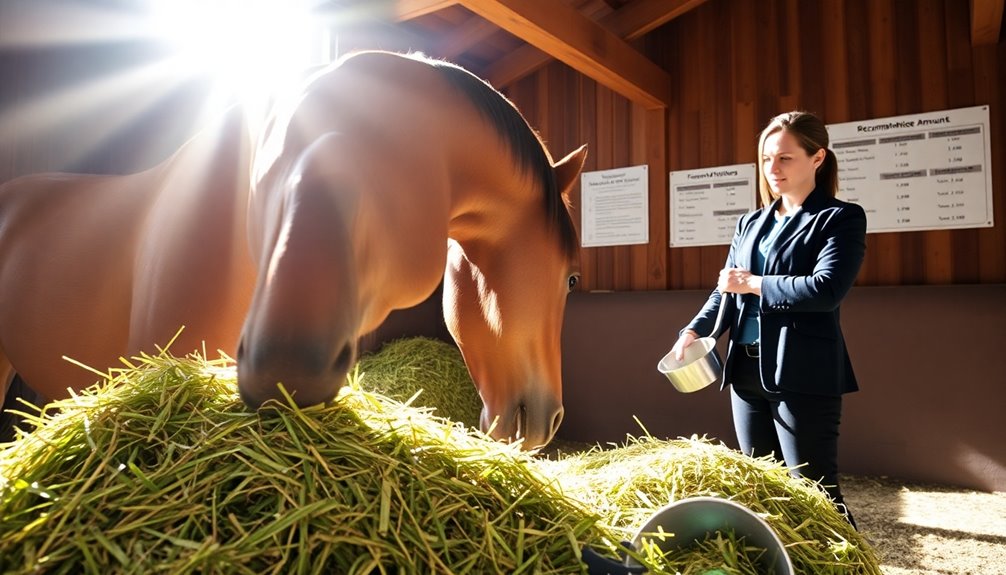
A horse's diet isn't something to take lightly, and seeking professional guidance is vital for maintaining its health. Consulting with a veterinarian or equine nutritionist guarantees your horse's dietary needs are accurately met, considering factors like age, activity level, and body condition scoring.
Nutritional deficiencies can lead to serious health issues, so having a balanced diet is essential. Regular assessments by a professional help adjust feeding plans in response to your horse's changing health or workload. This is especially important for underweight or overweight horses, where tailored feeding plans promote healthier weight management.
Understanding specific forage intake requirements—ranging from 1.5% to 3.1% of your horse's body weight daily—is significant, and a professional can help calculate these needs accurately.
Frequently Asked Questions
How Much Forage Should a Horse Eat per Day?
When considering how much forage your horse should eat daily, aim for about 1.5% to 2.5% of their body weight.
For a 1,000 lb horse, that's roughly 15 to 25 lbs of forage.
If you've got a lactating mare, she'll need around 2.8%.
What Is the Forage Requirement for a Horse?
Your horse's forage requirement is nothing short of a culinary masterpiece!
Generally, they need between 1.5% and 3.1% of their body weight in forage daily. For a maintenance horse, aim for around 1.0-2.0%. If you've got a lactating mare, she'll need about 2.8%.
Is 2 Flakes of Hay Enough for a Horse?
Two flakes of hay probably aren't enough for your horse.
Depending on its size and the weight of the flakes, your horse might need between 15 to 30 pounds of hay daily.
If your horse's body condition isn't ideal, or if it's a lactating mare or a performance horse, you may need to increase the forage considerably.
Always monitor your horse's health and adjust its diet accordingly to guarantee it gets the nutrition it needs.
What Is the Minimum Forage Intake Recommendation for Most Mature Horses?
Most mature horses need to eat at least 1.5% to 2.5% of their body weight in forage daily.
For instance, if your horse weighs 1,000 lbs, you're looking at around 15 to 25 lbs of forage each day.
It's really important to provide high-quality forage, as poor options can lead to health issues.
Keep an eye on your horse's activity level and adjust their intake accordingly to guarantee they stay healthy and happy.
Conclusion
In summary, ensuring your horse gets the right amount of forage is vital for their health and well-being. Did you know that horses typically need about 1.5% to 2% of their body weight in forage daily? That means a 1,000-pound horse should eat 15 to 20 pounds of forage each day! By understanding their dietary needs and managing their grazing effectively, you can keep your horse happy, healthy, and thriving. Don't hesitate to seek professional guidance for tailored advice!

